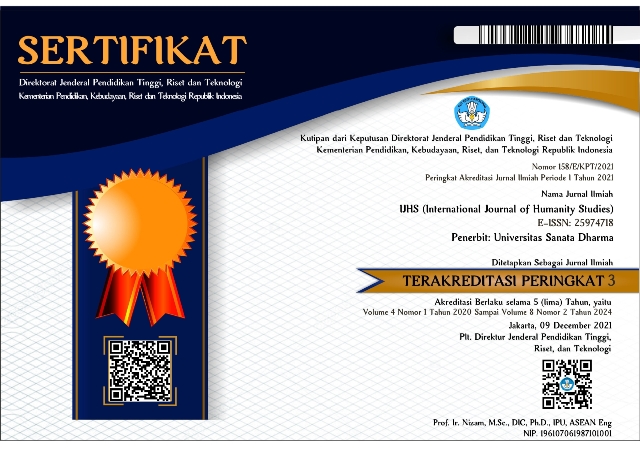THE REPRESENTATION OF THE IDEAL SUNDANESE, ACCORDING TO KANG DEDI MULYADI YOUTUBE CHANNEL
(1) Universitas Logistik dan Bisnis Internasional, Indonesia
(2) Universitas Logistik dan Bisnis Internasional, Indonesia
(*) Corresponding Author
Abstract
Celebrity, including politicians, is often seen as the epitome of one specific culture. Dedi Mulyadi attempts to present himself as an ideal Sundanese for his viewers through his YouTube channel. With almost 4 million subscribers, the politician has become an internet sensation as his Sundanese characteristics reach many viewers. This article tries to elaborate on the idea of being Sundanese according to Dedi Mulyadi's YouTube Channel. There are many ways to elaborate on this idea; this article focuses on his utterances in interacting with certain people. Thus, the pragmatic approach covering mixing code, speech act, and the representation issue is applied in this article to break down the selected conversation. Eventually, the findings show that Dedi Mulyadi uses conversational pragmatics to represent himself as an ideal Sundanese. According to his videos, the caring, compassionate, yet assertive leader is what it means to be an ideal Sundanese.
Keywords
Full Text:
PDFReferences
Albaugh, E. A. (2007). Language choice in education: A politics of persuasion. Journal of Modern African Studies, 45(1), 1–32. https://doi.org/10.1017/S0022278X06002266
Ardiati, R. L. (2022). Cultural efforts to maintain environmental sustainability: A study of the pragmatics of politeness on ethical planks in rural Sunda. Research Horizon, 2(4), 455-464.
Blommaert, J. (2015). Urban language & literacies: Pierre Bourdieu and language in society Pierre Bourdieu and language in society. In J.O. Ostman & J. Verschueren (eds.), Handbook of pragmatics (pp.2-12). Amsterdam: Benjamins.
Chintawidy, P. A., & Sartini, N. W. (2022). A cross-cultural pragmatics study of request strategies and politeness in Javanese and Sundanese. Journal of Pragmatics Research, 4(1), 152–166. https://doi.org/10.18326/jopr.v4i2.152-166
Citraresmana, E., Wahya, W., & Djajasudarma, F. (2019). Sundanese language performance of the elementary school teacher. Proceedings of the Second Conference on Language, Literature, Education, and Culture (ICOLLITE 2018), 105-111. Atlantis Press. https://doi.org/10.2991/icollite-18.2019.22
Fiske, J. (2010). Reading the popular (2nd ed.). London: Routledge.
Grossberg, L. (2012). Identity and cultural studies: Is that all there is? In S. Hall & P. D. Gay (Eds.), Questions of cultural identity (pp. 87–107). Newbury Park, CA: SAGE Publications Ltd. https://doi.org/10.4135/9781446221907.n6
Gruber, H. (2022). Political language and textual vagueness. Pragmatics, 3(1), 1–28. https://doi.org/10.1075/prag.3.1.01gru
Hall, S. (1990). Cultural identity and diaspora. In J. Rutherford (Ed.), Identity: Community, culture, difference (pp. 222–237). London: Lawrence & Wishart.
Hall, S. (1997). The spectacle of the ‘Other’. In H. Stuart (Ed.), Representation: Cultural representations and signifying practices (pp. 225–285). London: Sage Publication.
Hornikx, J., van Meurs, F., & de Boer, A. (2010). English or a local language in advertising?: The appreciation of easy and difficult English slogans in the Netherlands. Journal of Business Communication, 47(2), 169–188. https://doi.org/10.1177/0021943610364524
Indrayani, L. M. (2011). Language vitality: A case on Sundanese language as a surviving indigenous language. In T. McKinnon (Ed.), Language maintenance and shift (pp. 31–35). Semarang: Universitas Diponegoro.
Ismail, J. A., & Deane, J. (2008). The 2007 general election in Kenya and its aftermath: The role of local language media. International Journal of Press/Politics, 13(3), 319–327. https://doi.org/10.1177/1940161208319510
Krishna, A., & Ahluwalia, R. (2008). Language choice in advertising to bilinguals: Asymmetric effects for multinationals versus local firms. Journal of Consumer Research, 35(4), 692–705. https://doi.org/10.1086/592130
Khare, S.K. (2002). Truth about language in India. Economic & Political Weekly, 37(5), 4993-4994. http://dx.doi.org/10.2307/4412955
Locher, M. A. (1996). The ‘speech levels’ of Sundanese: Disfluency and identity. American Association of Applied Linguistics, 23–26.
Muller-Gotama, F. (1996). Topic and focus in Sundanese. Anthropological Linguistics, 38(1), 117-132.
Obeng, S. G. (1997). Is language and politics: Indirectness in political discourse. Discourse & Society, 8(1), 49-83. https://www.jstor.org/stable/42888089
Sudaryat, Y. (2015). The mindset of Sundanese people in their language expressions. Indonesian Journal of Applied Linguistics, 5(1), 120–126. https://doi.org/10.17509/ijal.v5i1.839
Tardy, C. M. (2011). Enacting and transforming local language policies. College Composition and Communication, 62(4).
Toomet, O. (2011). Learn English, not the local language! Ethnic Russians in the Baltic States. American Economic Review, 101(3), 526–531 https://doi.org/10.1257/aer.101.3.526
Trudell, J., Cheffy, I., & Trudell, B. (2019). Adult literacy, local languages and lifelong learning in rural African contexts. International Review of Education, 65, 341–349. https://doi.org/10.1007/s11159-019-09787-0
Vernaudon, J. (2015). Linguistic ideologies: Teaching oceanic languages in French Polynesia and New Caledonia. Contemporary Pacific, 27(2), 433–462. https://doi.org/10.1353/cp.2015.0048
Wilson, J. (1990). Politically speaking (1st ed.). Oxford: Basil Blackwell.
Yule, G. (1996). Pragmatics. Oxford: Oxford University Press.
DOI: https://doi.org/10.24071/ijhs.v7i1.5776
Refbacks
- There are currently no refbacks.
Copyright (c) 2023 Dimas Yudhistira, R.D. Nuraini Siti Fathonah

This work is licensed under a Creative Commons Attribution-ShareAlike 4.0 International License.
Indexed and abstracted in:
IJHS Sinta 3 Certificate (S3 = Level 3)
International Journal of Humanity Studies (IJHS) has been nationally accredited Sinta 3 by the Ministry of Education, Culture, Research and Technology of the Republic of Indonesia based on the decree No. Surat Keputusan 158/E/KPT/2021. Validity for 5 years: Vol 4 No 1, 2020 till Vol 8 No 2, 2024

This work is licensed under CC BY-SA.
Creative Commons Attribution-ShareAlike 4.0 International License.
p-ISSN: 2597-470X (since 31 August 2017); e-ISSN: 2597-4718 (since 31 August 2017)
Notice: The opinions expressed in this publication are those of the authors. They do not purport to reflect the opinions or views of the editorial team or publishers.
International Journal of Humanity Studies (IJHS) is a scientific journal in English published twice a year, namely in September and March, by Sanata Dharma University, Yogyakarta, Indonesia.

















